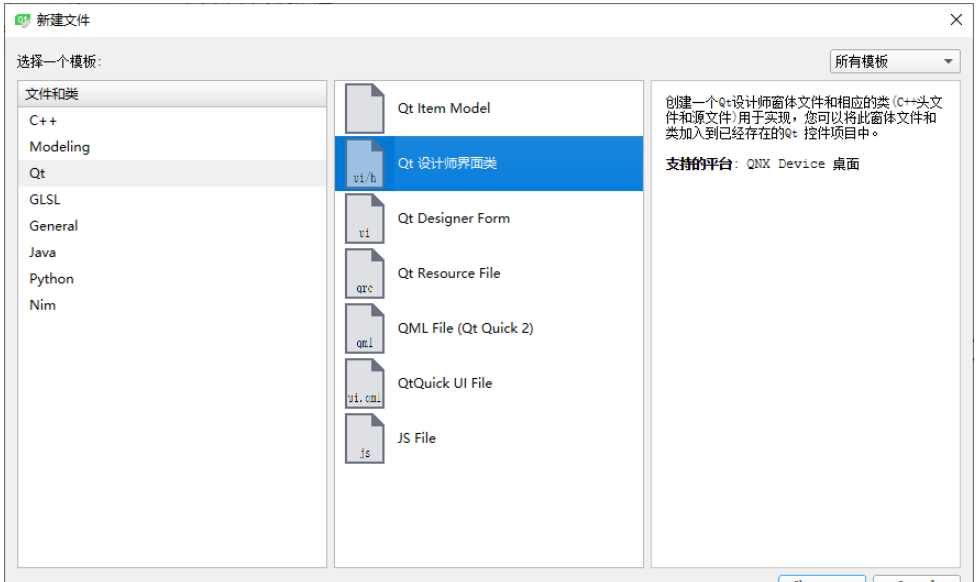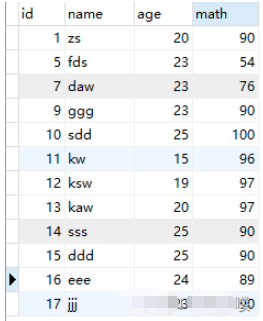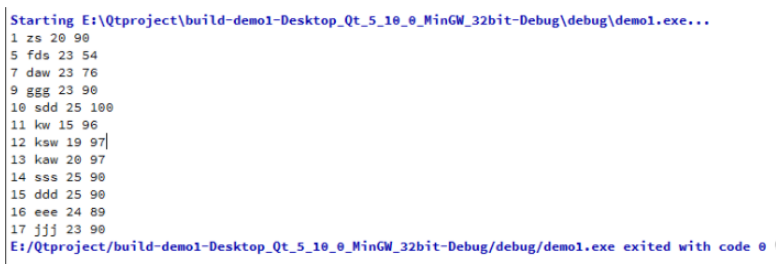How to operate MySQL database in Qt
1. Install the driver
(1) Installation
To operate the MySQL database in Qt, you must first install the mysql driver file. Just copy the libmusql.dll file under MySQL to the bin folder under the Qt installation path.

Paste the libmysql.dll file directly into this folder.

(2) Verify whether the driver is installed successfully
After the copy is successful, test whether the driver is installed successfully, create a new file, and select the Qt designer interface class, and all subsequent operations can be kept as default.

Introduce the following libraries into the newly generated .cpp file
#include <QSqlDatabase> #include <QDebug> #include <QMessageBox> #include <QSqlError> #include <QString> #include <QSqlQuery> #include <QVariantList>
Insert the following code in the constructor, and then click Run, if no warning window pops up It means the installation is successful, otherwise it fails.
//添加一个数据库
QSqlDatabase db=QSqlDatabase::addDatabase("QMYSQL"); //括号内要写出数据库的类型
//设置数据库
db.setHostName("127.0.0.1"); //设置数据库的主机ip
//设置数据库的用户名
db.setUserName("root");
//设置数据库的密码
db.setPassword("123456"); //这个就是安装MySQL时设置的密码
//设置数据库的名字
db.setDatabaseName("aaa2");
//打开数据库(已经安装过mysql驱动了)
if(db.open()==false){
QMessageBox::warning(this,"waring",db.lastError().text());
}2. Using MySQL database
(1) Single statement execution
First create a QString object sql, write the statement to be executed in sql, and then create the QSqlQuery class The object query calls its exec() function to execute the code in sql.
QString sql = "insert into student (id,name,age,math) values (1,'kaw',20,97)"; //书写想要执行的语句
QSqlQuery query; //创建一个QSqlQuery对象
query.exec(sql); //执行mysql语句(2) Multiple statement execution
In sql, multiple statements can be executed at the same time by separating each statement with a semicolon. The following operations are performed to add, delete and update the table at the same time.
QString sql = "insert into student (id,name,age,math) values (13,'kaw',20,97);delete from student where id=2;update student set name='sdd',math=100 where id=10;";
QSqlQuery query; //创建一个QSqlQuery对象
query.exec(sql); //执行mysql语句(3) Batch processing operation
Method 1: addBindValue()
Enter the statement you want to execute in query.prepare(), where the to-be-entered The value is replaced by "?", where "?" is the wildcard character. When adding the values you want to set later, you can use idList, nameList, ageList and mathList. To avoid errors, please use addBindValue() in the order of id, name, age, and math to bind values.
QSqlQuery query;
query.prepare("insert into student (id,name,age,math) values (?,?,?,?)"); //书写语句模型
//添加绑定数据
QVariantList idList; //创建一个id列表
idList << 15<<16<<17;
query.addBindValue(idList); //完成第一个?的绑定
QVariantList nameList;
nameList << "ddd"<<"eee"<<"jjj";
query.addBindValue(nameList); //完成第二个?的绑定
QVariantList ageList;
ageList << 25<<24<<23;
query.addBindValue(ageList); //完成第三个?的绑定
QVariantList mathList;
mathList << 90<<89<<90;
query.addBindValue(mathList); //完成第四个?的绑定
//执行批处理
query.execBatch();Method 2: bindValue()
Directly use a custom name to complete the binding. At this time, the binding order can be decided by yourself.
QSqlQuery query;
query.prepare("insert into student (id,name,age,math) values (:id,:name,:age,:math)"); //:id之类的名字时自定义的 自己方便就好
//添加绑定数据
QVariantList idList; //创建一个id列表
idList << 18<<19<<20;
query.bindValue(":id",idList); //完成:id的绑定
QVariantList nameList;
nameList << "ddd"<<"eee"<<"jjj";
query.bindValue(":name",nameList); //完成:name的绑定
QVariantList ageList;
ageList << 25<<24<<23;
query.bindValue(":age",ageList); //完成:age的绑定
QVariantList mathList;
mathList << 90<<89<<90;
query.bindValue(":math",mathList); //完成:math的绑定
//执行批处理
query.execBatch();(4) Query
The table to be queried is:

The value after value can be an index or a column name. After taking it out, it needs to be converted into the corresponding data type.
//查询操作
QSqlQuery query;
query.exec("select * from student");
while(query.next()){
qDebug()<<query.value(0).toInt()
<<query.value("name").toString().toUtf8().data()
<<query.value(2).toInt()
<<query.value(3).toInt();
}Query results:

The above is the detailed content of How to operate MySQL database in Qt. For more information, please follow other related articles on the PHP Chinese website!

Hot AI Tools

Undresser.AI Undress
AI-powered app for creating realistic nude photos

AI Clothes Remover
Online AI tool for removing clothes from photos.

Undress AI Tool
Undress images for free

Clothoff.io
AI clothes remover

Video Face Swap
Swap faces in any video effortlessly with our completely free AI face swap tool!

Hot Article

Hot Tools

Notepad++7.3.1
Easy-to-use and free code editor

SublimeText3 Chinese version
Chinese version, very easy to use

Zend Studio 13.0.1
Powerful PHP integrated development environment

Dreamweaver CS6
Visual web development tools

SublimeText3 Mac version
God-level code editing software (SublimeText3)

Hot Topics
 1654
1654
 14
14
 1413
1413
 52
52
 1306
1306
 25
25
 1252
1252
 29
29
 1225
1225
 24
24
 MySQL's Role: Databases in Web Applications
Apr 17, 2025 am 12:23 AM
MySQL's Role: Databases in Web Applications
Apr 17, 2025 am 12:23 AM
The main role of MySQL in web applications is to store and manage data. 1.MySQL efficiently processes user information, product catalogs, transaction records and other data. 2. Through SQL query, developers can extract information from the database to generate dynamic content. 3.MySQL works based on the client-server model to ensure acceptable query speed.
 How to start mysql by docker
Apr 15, 2025 pm 12:09 PM
How to start mysql by docker
Apr 15, 2025 pm 12:09 PM
The process of starting MySQL in Docker consists of the following steps: Pull the MySQL image to create and start the container, set the root user password, and map the port verification connection Create the database and the user grants all permissions to the database
 Laravel Introduction Example
Apr 18, 2025 pm 12:45 PM
Laravel Introduction Example
Apr 18, 2025 pm 12:45 PM
Laravel is a PHP framework for easy building of web applications. It provides a range of powerful features including: Installation: Install the Laravel CLI globally with Composer and create applications in the project directory. Routing: Define the relationship between the URL and the handler in routes/web.php. View: Create a view in resources/views to render the application's interface. Database Integration: Provides out-of-the-box integration with databases such as MySQL and uses migration to create and modify tables. Model and Controller: The model represents the database entity and the controller processes HTTP requests.
 Solve database connection problem: a practical case of using minii/db library
Apr 18, 2025 am 07:09 AM
Solve database connection problem: a practical case of using minii/db library
Apr 18, 2025 am 07:09 AM
I encountered a tricky problem when developing a small application: the need to quickly integrate a lightweight database operation library. After trying multiple libraries, I found that they either have too much functionality or are not very compatible. Eventually, I found minii/db, a simplified version based on Yii2 that solved my problem perfectly.
 Laravel framework installation method
Apr 18, 2025 pm 12:54 PM
Laravel framework installation method
Apr 18, 2025 pm 12:54 PM
Article summary: This article provides detailed step-by-step instructions to guide readers on how to easily install the Laravel framework. Laravel is a powerful PHP framework that speeds up the development process of web applications. This tutorial covers the installation process from system requirements to configuring databases and setting up routing. By following these steps, readers can quickly and efficiently lay a solid foundation for their Laravel project.
 How to install mysql in centos7
Apr 14, 2025 pm 08:30 PM
How to install mysql in centos7
Apr 14, 2025 pm 08:30 PM
The key to installing MySQL elegantly is to add the official MySQL repository. The specific steps are as follows: Download the MySQL official GPG key to prevent phishing attacks. Add MySQL repository file: rpm -Uvh https://dev.mysql.com/get/mysql80-community-release-el7-3.noarch.rpm Update yum repository cache: yum update installation MySQL: yum install mysql-server startup MySQL service: systemctl start mysqld set up booting
 MySQL and phpMyAdmin: Core Features and Functions
Apr 22, 2025 am 12:12 AM
MySQL and phpMyAdmin: Core Features and Functions
Apr 22, 2025 am 12:12 AM
MySQL and phpMyAdmin are powerful database management tools. 1) MySQL is used to create databases and tables, and to execute DML and SQL queries. 2) phpMyAdmin provides an intuitive interface for database management, table structure management, data operations and user permission management.
 MySQL vs. Other Programming Languages: A Comparison
Apr 19, 2025 am 12:22 AM
MySQL vs. Other Programming Languages: A Comparison
Apr 19, 2025 am 12:22 AM
Compared with other programming languages, MySQL is mainly used to store and manage data, while other languages such as Python, Java, and C are used for logical processing and application development. MySQL is known for its high performance, scalability and cross-platform support, suitable for data management needs, while other languages have advantages in their respective fields such as data analytics, enterprise applications, and system programming.




